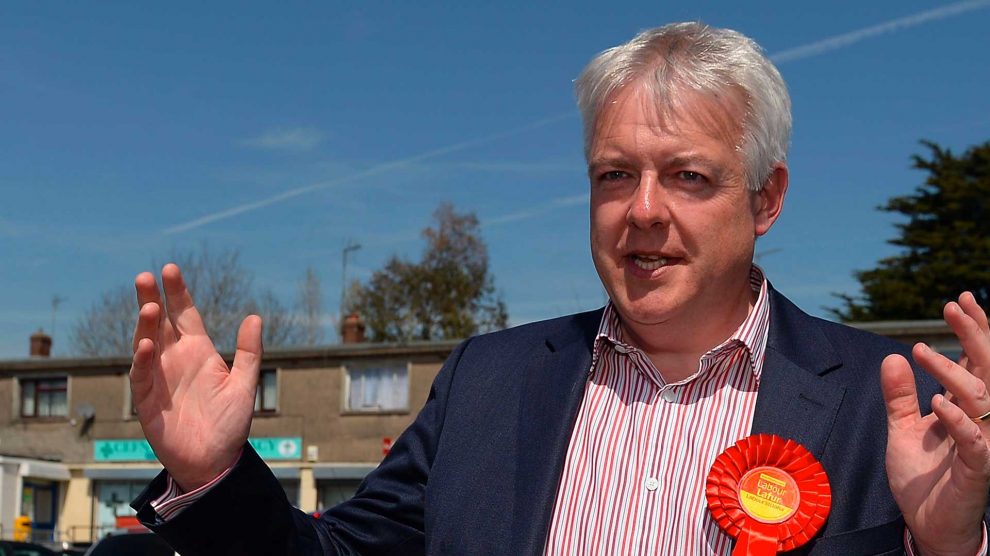A WAR of words has broken out between First Minister Carwyn Jones and former Cabinet member Leighton Andrews about allegations that a report into bullying was made by Mr Andrews to the First Minister as long ago as 2014 and that one of the AMs he reported as being a target of adverse briefing was the late Alyn & Deeside AM Carl Sargeant.
Mr Sargeant died in November this year after being dismissed from his Cabinet post.
He was sacked from his post on the basis of allegations about his behaviour that were never put to him.
The First Minister finds himself exposed on the issue, after making a series of pious announcements about how the Welsh Assembly would not cover up allegations of bullying and inappropriate behaviour following a series of allegations about the conduct of senior figures at Westminster.
That position has been progressively unpicked by Mr Andrews in a number of tweets, blog posts and very few media interviews.
And in the Welsh Assembly on Tuesday (Dec 12), Mr Jones’ position was left even more exposed by a dramatic personal statement by Conservative AM Darren Millar.
Mr Millar revealed that when he asked the First Minister questions about bullying in the Welsh Government in 2014, he did so at Mr Sargeant’s request and timed the questions to coincide with Mr Sargeant telling him that a formal complaint of bullying had been made against a special advisor (SPAD) to the Welsh Government.
Mr Jones was not in the Senedd to hear Mr Millar’s statement, having left after fielding First Minister’s questions.
TWO ISSUES UNRAVELLED
The issue of the First Minister’s treatment of Carl Sargeant and the latter’s death have become intertwined with a second issue, namely whether or not the First Minister misled the Assembly when he said – three years ago – no allegations of bullying had been made to him about the conduct of either special advisers or specialist advisers.
This article sets out the way in which both issues wind around themselves and why Carwyn Jones finds himself in jeopardy.
There are currently three investigations ongoing that affect the First Minister directly and indirectly. A further investigation – into allegations made against Carl Sargeant – has been discontinued.
The first investigation is into the way Mr Jones investigated allegations against Mr Sargeant; the second is into whether he misled AMs; the final one is the investigation by HM Coroner into Carl Sargeant’s death. Any one of the outcomes of those investigations have the potential to end Mr Jones’ career in ignominy.
While each of those investigations are hazardous to the First Minister’s political health, if Mr Jones is found to have breached the Ministerial Code of Conduct, there is no way for him to ride out the ensuing storm.
WHAT IS THE MINISTERIAL CODE?
‘Ministers are expected to behave according to the highest standards of constitutional and personal conduct in the performance of their duties’.
The ministerial Code, issued by the First Minister, provides guidance to ministers on how they should act and arrange their affairs in order to uphold these standards. In particular, they are expected to observe the 7 principles of public life and the principles of ministerial conduct. The code applies to Cabinet Secretaries, Ministers and the Counsel General.
WHAT DOES THE CODE SAY?
‘It is of paramount importance that Ministers give accurate and truthful information to the Assembly, correcting any inadvertent error at the earliest opportunity. Ministers who knowingly mislead the Assembly will be expected to offer their resignation to the First Minister.
‘In particular, the First Minister may also refer matters concerning himself to an Independent Adviser’.
WHY IS CARWYN JONES IN DIFFICULTIES?
In November 2014, Darren Millar AM submitted a Written Assembly Question to the First Minister asking: ‘Has the First Minister ever received any reports or been made aware of any allegations of bullying by special and/or specialist advisers at any time in the past three years and, if so, when and what action, if any, was taken?’
Mr Jones’ answer could not have been more unequivocal: ‘No allegations have been made’.
WHAT IS CARWYN JONES ALLEGED TO HAVE DONE?
Mr Jones’ version of events has been challenged by his former Cabinet colleague Leighton Andrews.
Leighton Andrews says: ‘I made a complaint to the First Minister about one aspect of [deliberate personal undermining of Carl Sargeant], of which I had direct evidence, in the autumn of 2014. An informal investigation was undertaken. I then asked for it to be made formal. I was told it would be. I was never shown the outcome. There was no due process’.
Mr Jones has maintained that no allegations were made, sparking a war of words between himself and Mr Andrews. At First Minister’s questions on December 5, Carwyn Jones came perilously close to calling his former colleague a liar. Mr Andrews responded by publishing a more detailed account of events and invited the First Minister to repeat what he had said in the Senedd without the benefit of Parliamentary Privilege to protect him from legal action.
Mr Jones has, so far, declined Mr Andrews’ invitation.
Now, fuel has been thrown onto the smoking embers under the First Minister.
In a devastating Personal Statement in the Senedd this Tuesday, the Conservative AM Darren Millar revealed that not only had he been asked by the late Carl Sargeant to ask the November 2014 question, but also that Mr Sargeant asked him to delay asking the question until AFTER an allegation of bullying was made to the First Minister against a named SPAD. By way of corroboration, Mr Millar revealed that he had discussed the matter during October and November 2014 with the Conservative Chief Whip, Paul Davies. Mr Millar also said that other AMs were aware of what was going on.
CARWYN’S DILEMMA
The First Minister’s answer can only be read compatibly with the accounts given by Mr Millar and Mr Andrews if he can claim either that he did not understand the question at the time, or that the question was phrased so as to make his answer entirely truthful without it being in anyway accurate. Mr Jones has suggested that what he calls his ‘lawyerly way’ might have led him into answering the question the way he did, but he has rather undone that suggestion by his subsequent comments attacking others’ accounts.
If the answer cannot be read compatibly with the accounts of his fellow AMs – and it is a significant verbal stretch to perceive how it might be, no matter how ‘lawyerly’ Mr Jones’ way is – then the choices left are stark.
For Mr Jones’ response in November 2014 to hold water he will have to successfully advance the proposition that several other AMs are themselves lying or are/were mistaken. The odds are not in Mr Jones’ favour on that one.
And the alternative position for Mr Jones – that he did not treat complaints as being made formally or that complaints that were made to him were not made in the correct form or format – lays him open to a charge of dealing with Mr Millar’s questions in less than good faith. Moreover, if Mr Jones did not take the allegations seriously because he regarded it as part and parcel of the normal rough and tumble of politics, it runs an absolute coach and horses through the pious approach he took before Mr Sargeant’s death.
Neither proposition, no matter how finessed, lets Carwyn Jones off the hook. The former would instantly end his career as First Minister; the latter would wound him so severely that he would - almost certainly – be persuaded to step down in favour of an alternative leader. In short, and in either of those circumstances, Mr Jones was either a knave or a fool.
WHO KNEW WHAT AND WHEN?
And there is another wrinkle of suspicion that bears consideration: if Mr Sargeant did complain about an over-mighty SPAD, it is open to question whether or not his card was marked. A self-perpetuating club of insiders would not take kindly to having their gilded cages rattled; links are undeniably strong between the national Welsh media and some ministerial special advisers.
That possibility is given some credence by what former Cabinet member Leighton Andrews wrote on his blog.
The Herald contacted Mr Andrews regarding his blog’s content and the First Minister’s remarks regarding bullying. He gave us permission to quote directly from his blog.
‘From discussions with many well-connected individuals over the last few weeks I have been able to piece together the following:
- A Labour AM told the Labour Assembly Group meeting on November 9 that he had been texted by someone he regarded as a reliable source that Carl was to lose his job, before the reshuffle was announced
- A leading Welsh journalist received a text in advance of the reshuffle’s announcement that Carl was to be sacked
- A Welsh Labour MP told another Welsh Labour MP that Carl was to lose his job, before the reshuffle was announced’
Mr Andrews asks the question ‘who leaked?’ The ancillary questions to that are ‘who would benefit from such a leak?’ and ‘what would be such a leak’s purpose?’
A QUESTION OF TIMING
Mr Andrews’ sequence of events is of vital importance.
Mr Sargeant was dismissed as a Cabinet Secretary on November 3 and died on November 7. Two days after that event members of the Labour Assembly Group were told by one of their number that their deceased former colleague’s dismissal was leaked to them before Carl Sargeant was dismissed. Mr Andrews’ allegations that news of Mr Sargeant’s dismissal was currency among Labour MPs beforehand and a journalist was informed would be the toxic icing on a cake.
The reason for that is straightforward: at the time he was dismissed and at the time of his death Mr Sargeant had not been given the details of the allegations made against him by anonymous third parties whose versions of events he was given no opportunity to rebut. The leaking of his dismissal suggests that the case against Mr Sargeant had been judged by the First Minister and a decision made that would take no account of his innocence, guilt, or ability to answer the charges. If, has been alleged, the First Minister had previously dismissed one of the complaints relied upon to sack his ‘dear friend’, questions arise about the First Minister’s competence in deciding the allegations. Most tellingly, it is one of Mr Jones’ SPADs who carried out inquiries for the First Minister into the allegations against Mr Sargeant.
The number of people who would and should have known about both the investigation into Mr Sargeant and the decision to dismiss him would have been passingly small. Mr Jones himself and perhaps a handful of other people. Political circles being notorious hubs for gossip, it would take only one leak for ripples to spread.
There is no doubt that if the First Minister does not know who leaked he is being peculiarly incurious.
At the end of Mr Millar’s statement on Tuesday, a number of prominent Labour members exchanged looks that suggested that their consciences might well now be pricking them into reflecting on what they knew.
Mr Jones’ position has not looked more precarious than it does now and, while some AMs have accused others of seeking to settle political scores, it seems that Mr Millar’s intervention might well prove the one that does for the First Minister.


















Add Comment